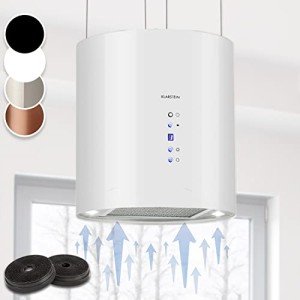You'll Be Unable To Guess Kitchen Island Extractor's Tricks
페이지 정보
작성자 Arlie 댓글 0건 조회 7회 작성일 25-05-19 14:23본문

The Essential Guide to Kitchen Island Extractors: A Comprehensive Overview
In modern-day kitchen style, the kitchen island has actually become a central feature, serving both visual and functional functions. To enhance the cooking experience, lots of property owners are opting for kitchen island extractors, which not only get rid of cooking odors but likewise include to the kitchen's overall design. This short article will check out various elements of kitchen island extractors, including their benefits, types, setup factors to consider, and upkeep. Furthermore, common FAQs will likewise be resolved to supply a clearer understanding of this innovative kitchen function.

Comprehending Kitchen Island Extractors
Kitchen island extractors are ventilation systems installed above kitchen islands that help in getting rid of smoke, steam, and odors produced during cooking. Unlike conventional hoods that are set up versus walls, island extractor hoods extractors hang from the ceiling, making them ideal for open-plan designs that feature a central kitchen island.
Advantages of Kitchen Island Extractors
Improved Air Quality: Best suited for busy kitchen areas, island hood extractors considerably enhance the air quality by removing air-borne impurities.
Boosted Aesthetics: Available in various designs and finishes, these extractors can match a kitchen's decoration, adding a touch of elegance.
Space Optimization: They maximize counter space, as they don't need wall mounting, permitting for more flexibility in kitchen style.
Customizable: Many models offer adjustable fan speeds, lighting functions, and an option of ducted or recirculating alternatives to suit specific needs.
Types of Kitchen Island Extractors
1. Ducted Extractors
Ducted kitchen island kitchen hood extractors are connected to a duct system that vents air outside. They are frequently chosen for their efficiency in removing smoke and odors.
Pros:
- Better air quality
- More reliable at smell removal
- Peaceful operation
Cons:
- More intricate installation
- Needs structural alterations
2. Recirculating Extractors
Recirculating extractors filter air through charcoal or grease filters and return the cleansed air back into the kitchen. These are perfect for areas where ductwork isn't possible.
Pros:
- Easier setup
- Less intrusive
Cons:
- Less efficient at odor removal
- Regular filter replacements needed
3. Downdraft Extractors
Downdraft extractors are integrated into the countertop and rise up throughout use. Although they are not as popular as conventional hoods, they are a great option for minimalistic styles.
Pros:
- Space-saving style
- Ideal for particular layouts
Cons:
- Less reliable compared to standard extractors
- Greater installation costs
| Type | Pros | Cons |
|---|---|---|
| Ducted | Excellent air quality, peaceful | Complex installation |
| Recirculating | Easy setup, less invasive | Routine filter changes essential |
| Downdraft | Space-saving, sleek design | Greater expenses, less efficient |
Installation Considerations
Setting up a kitchen island extractor (related web-site) requires cautious preparation. Here are some essential aspects to remember:
Height: The ideal height for Island hood (fkwiki.win) setting up an extractor is 30-36 inches above the cooking surface. For gas stoves, the height must be closer to 36 inches.
Size: Ensure the extractor is 6-12 inches broader than the cooktop on all sides for optimal efficiency.
Ducting: If going with a ducted extractor, plan for duct positioning. This may need ceiling modifications or additional building and construction work.
Electrical Supply: Ensure compliance with regional codes and policies when setting up electrical elements for lighting and motor functions.
Design Compatibility: Consider the kitchen's overall style theme and choose an extractor that balances with existing aspects.
Upkeep and Care
To make sure ideal performance, regular maintenance of kitchen island extractors is vital. Here are some tips:
Clean Filters Regularly: Depending on the type of extractor, filter cleaning or replacement must be done every 1-3 months.
Inspect the Motor: Regularly inspect the motor and fan for debris build-up and ensure they are working properly.
Lube Moving Parts: Lubrication will extend the life of your extractor and decrease sound levels.
Look For Duct Blockages: If you have a ducted system, occasionally look for any blockages or damage to the ductwork.
FAQs About Kitchen Island Extractors
1. How do I select the ideal size extractor for my kitchen?
Picking the ideal size extractor includes measuring the width of your cooktop and making sure the extractor is 6-12 inches broader on either side.
2. Are kitchen island extractors loud?
The majority of modern kitchen island extractors are developed for quiet operation, kitchen island extractor especially at lower fan speeds. However, sound levels can vary based upon design and settings.
3. What is the average expense of a kitchen island extractor?
Rates can range from ₤ 200 to over ₤ 2,000, depending on the brand, type, and functions. Installation costs will vary based upon regional labor rates and the complexity of the setup.
4. Can I install an extractor myself?
While some property owners select DIY installation, it is recommended to employ a professional, especially for ducted systems, to make sure safety and compliance with regional codes.
5. How frequently should I have my kitchen island extractor serviced?
An annual service by an expert is advisable for ducted systems to inspect for blockages, while recirculating systems need to have filters replaced every couple of months.
In conclusion, kitchen island hood kitchen extractors are both useful and elegant solutions for contemporary cooking areas. With numerous types, installation factors to consider, and upkeep requirements, it's vital for property owners to inform themselves about the various alternatives offered. By picking the ideal extractor, they can produce an enjoyable cooking environment and boost the kitchen's functionality and appearance.
댓글목록
등록된 댓글이 없습니다.